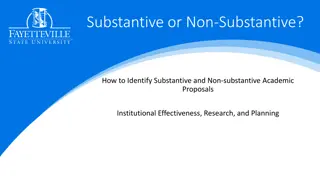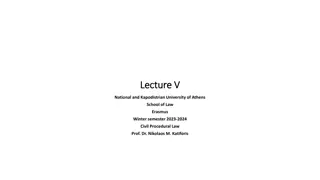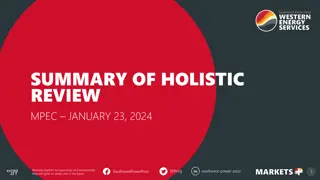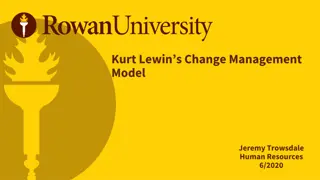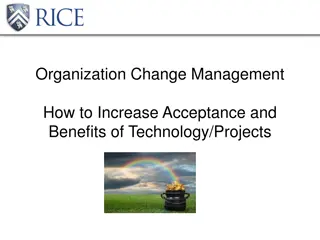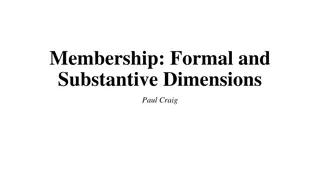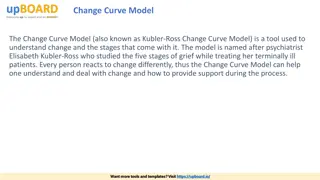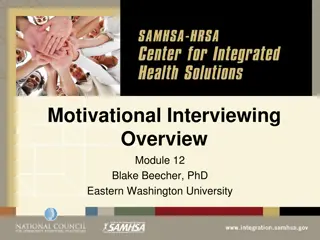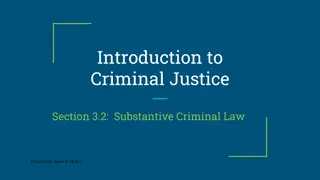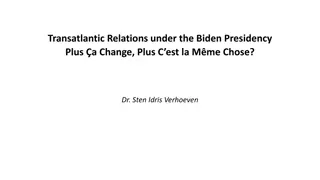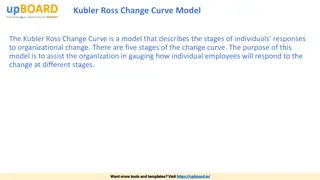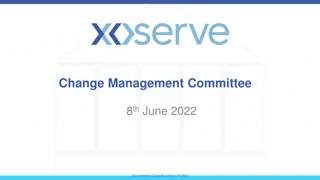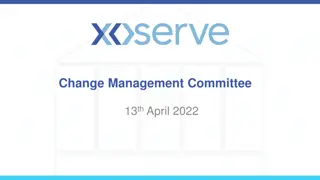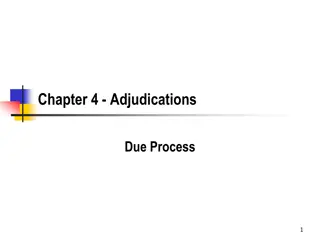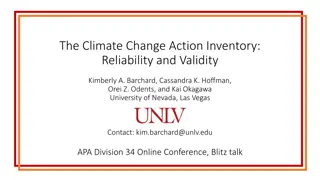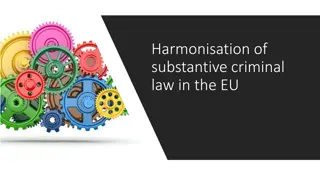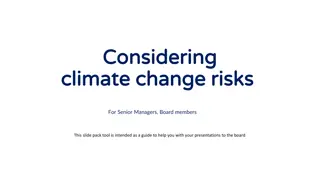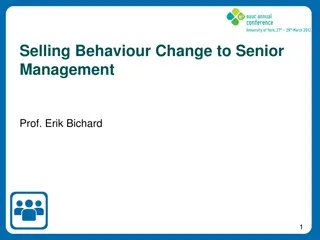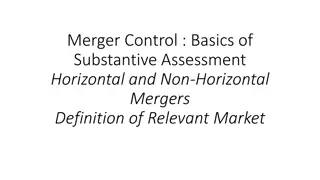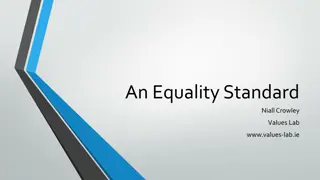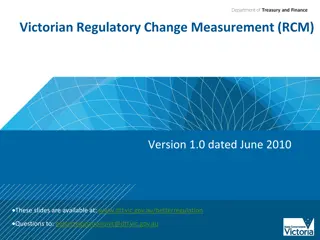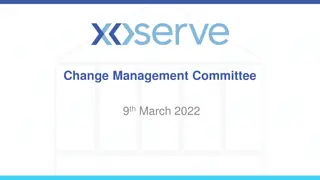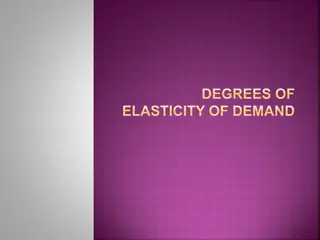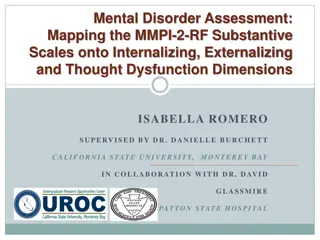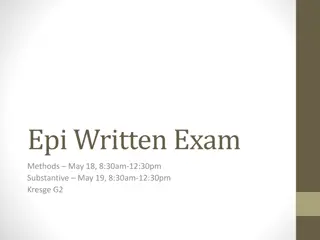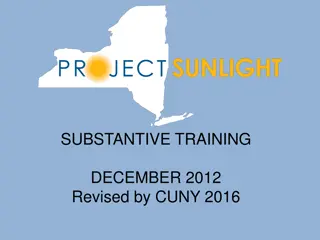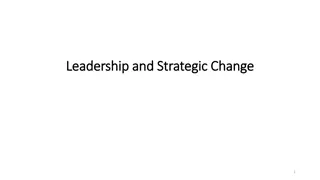2023 Annual Reporting Webinar: Guidelines & Deadlines
Join the webinar for Public Health Programs on Oct 3, 2023, to learn about submitting annual reports. Explore account setup, questionnaire walkthrough, and Q&A sessions. Review general guidelines for reporting and submission deadlines. Ensure accurate reporting for SPH/PHP programs in the reaccredit
2 views • 43 slides
Overview of EU Criminal Law: Classes, Exam, and Directives
This content provides detailed information on substantive and procedural aspects of EU Criminal Law, covering classes, terms of participation, exam details, and specific directives. It includes guidelines on passing the classes through active participation, presentations, and exams. The schedule out
3 views • 13 slides
How Do I Change My Passenger Names on Spirit Airlines?
To change the name on your Spirit Airlines flight reservation, follow the Spirit Airlines Name Change Policy. Here's a general guide on how to go about it:\nContact Spirit Airlines: Reach out to Spirit Airlines customer service through phone or online channels.\nExplain the Situation: Clearly explai
4 views • 6 slides
Identifying Substantive and Non-Substantive Academic Proposals
Learn how to distinguish between substantive and non-substantive academic proposals in institutional effectiveness, research, and planning. Discover the criteria and processes for identifying these proposals, including which ones require specific approvals and reviews from academic committees. Gain
0 views • 23 slides
Gender-based Climate Change Litigation: A Key Solution?
Gender-based climate change litigation is emerging as a potential solution to address the disproportionate impact of climate change on different genders. Various international bodies have recognized the importance of integrating a gender-responsive approach in climate action to uphold human rights,
4 views • 12 slides
Proceedings for Provisional Remedies in Civil Procedural Law
Greek legal theory distinguishes between conservatory and regulatory provisional remedies to secure substantive rights or provisionally arrange disputed situations. These remedies are constitutionally guaranteed and granted under specific substantive and procedural conditions. The procedure involves
0 views • 14 slides
Summary of Holistic Review of MPEC Tariff
Provide a summary of the holistic review conducted by SPP Staff on the MPEC Tariff, covering both non-substantive and substantive changes made for review and approval by MDWG. The review includes critical dates, tariff outline, updates from working groups/task forces, and a detailed table of content
0 views • 11 slides
Understanding Kurt Lewin's Change Management Model
Explore Kurt Lewin's Change Management Model, its key components, implementation strategies, and the factors that contribute to the success or failure of change initiatives. Learn about Kurt Lewin's background, Lewin's Golden Rules for Change, common barriers to change, and the essential factors tha
1 views • 50 slides
Harmonisation of Substantive Criminal Law in the EU
The Treaty of Lisbon serves as a legal foundation for the harmonisation of substantive criminal law within the European Union. It establishes the basis for judicial cooperation, mutual recognition of judgments, and approximation of laws across Member States. The treaty allows for the establishment o
2 views • 60 slides
Navigating Change: Understanding Transition Dynamics
Explore the nuances of change versus transition, common reactions, and losses associated with change. Discover how change is a process that involves adapting and managing individual reactions and uncertainties. Understand the dynamics of change, including the sense of loss and confusion that accompa
0 views • 21 slides
Maximizing Acceptance and Benefits of Technology Projects Through Change Management
Change management plays a critical role in increasing the success rate of technology projects by enhancing acceptance, delivering benefits, mitigating risks, and treating employees correctly. Initiatives with excellent change management are six times more likely to meet objectives compared to those
0 views • 9 slides
Dimensions of Membership in the European Union
The formal and substantive dimensions of membership in the European Union are outlined, including the criteria for accession and withdrawal. Formal criteria involve unanimity, consent of the European Parliament, and ratification of agreements, while substantive requirements focus on a state's commit
0 views • 22 slides
Understanding the Change Curve Model: A Tool for Managing Change
The Change Curve Model, developed by Elisabeth Kubler-Ross, helps individuals navigate the stages of change by addressing denial, anger, bargaining, depression, and acceptance. This model provides a framework to understand different reactions to change and offers strategies to support individuals th
0 views • 4 slides
Key Insights into Motivational Interviewing for Behavior Change
Explore the essential components of motivational interviewing for behavior change, such as the Spirit of MI, OARS practice, Stages of Change, and ways to elicit and sustain change talk. Discover the key role of client motivation in achieving successful outcomes and challenge common beliefs about wha
4 views • 50 slides
Understanding Substantive Criminal Law in the American Legal System
Substantive criminal law encompasses the definition of criminal acts and penalties, with a core principle being that there can be no crime without a corresponding law. The American legal system follows the Rule of Law, ensuring that all individuals are subject to legal governance. Constitutional lim
0 views • 22 slides
Transatlantic Relations under the Biden Presidency: Continuity or Change?
Amid the tumultuous Trump presidency, transatlantic relations faced challenges with a focus on economic issues, NATO, and global engagement. The election of Joe Biden brought hope for a revival in these relations, aligning with Europe's anticipation for a renewed partnership. This article explores w
4 views • 16 slides
Understanding Kubler Ross Change Curve Model for Organizational Change
The Kubler Ross Change Curve Model delineates five stages - Decision, Denial, Frustration, Depression, and Experiment - illustrating individual responses to organizational change. Recognizing these stages aids organizations in anticipating and managing employee reactions effectively. Each phase invo
0 views • 4 slides
Understanding Substantive Information in ODR Platforms
Explore two types of substantive information regarding small claims and debt claim cases, including definitions, sources, and relevant statutes in Texas. Gain insights into the legal processes and resources available for handling such cases effectively.
1 views • 13 slides
Climate Change and Development in Africa: A Journey from Kyoto to Paris
The journey of climate change negotiations in Africa, from key milestones in the climate change regime to the role of African institutions and bodies, such as the African Union and African Ministerial Conference on the Environment. Highlights include the entry into force of the UNFCCC, the adoption
1 views • 15 slides
Understanding Drought Impact and Climate Change in Jordan
Analysis of the impact of water scarcity and drought in Jordan, focusing on the most affected areas, implications of climate change, and the Middle East's vulnerability to water insecurity. The research explores the intersection of climate change, water resources, agriculture, and food security, hig
1 views • 24 slides
Comprehensive Overview of Change Management Committee & Budget Planning
This document collection provides a detailed insight into the Change Management Committee's activities, budget planning, horizon planning, committed budget spends, and development pipelines. It covers various aspects such as change budget tracking, pipeline development stages, change implementation
0 views • 85 slides
Change Management Committee Meeting Insights
Delve into the details of the Change Management Committee Meeting held on April 13, 2022. Explore topics such as change budgeting, horizon planning, budget vs. spend analysis, change pipeline, and development and delivery pipeline. Get an overview of the 2021-2022 DSC change and MiR pipeline, as wel
0 views • 55 slides
Exploring Due Process: Substantive and Procedural Dimensions
Dive into the intricacies of substantive and procedural due process, understanding the limits on government regulation and the significance of fair procedures in affecting individual rights. Explore the evolution of due process from historical perspectives to modern interpretations, reflecting on it
1 views • 27 slides
Understanding Climate Change Action: Inventory, Reliability, and Factors
The Climate Change Action Inventory comprises 77 items measuring various actions to combat climate change across eight domains. The method involved 500 MTurk workers, with reliability analyses showing strong internal consistency. Findings indicate a positive correlation between climate change anxiet
1 views • 20 slides
Harmonisation of Substantive Criminal Law in the EU: Treaty of Lisbon
The Treaty of Lisbon provides a legal basis for the harmonisation of substantive criminal law in the European Union through mutual recognition of judgments and directives establishing minimum rules for defining criminal offences and sanctions. Areas of crime covered include terrorism, human traffick
0 views • 45 slides
Addressing Climate Change Risks: Guidance for Senior Managers and Board Members
This slide pack tool provides guidance on addressing climate change risks for senior managers and board members. It covers key messages such as understanding obligations and gaps, identifying climate change risks, exploring responsibilities, and implementing actions to address these risks effectivel
0 views • 11 slides
Understanding and Influencing Human Behavior for Effective Policy Change
In this content, various aspects of human behavior, denial, anxiety, confusion, and common reasons for inaction are discussed in the context of policy and behavior change. The importance of understanding human decision-making processes and the need to change the context to drive behavioral change ar
0 views • 36 slides
Substantive Assessment of Mergers: Horizontal vs. Non-Horizontal
The substantive assessment of mergers involves evaluating whether a concentration significantly hinders effective competition. Horizontal mergers occur between undertakings in the same market, potentially reducing consumer choices. Non-horizontal mergers, such as vertical or conglomerate mergers, ha
1 views • 13 slides
Targeting Emotions to Facilitate Behavior Change in Older Adults
Efforts in changing health behavior have traditionally focused on social and cognitive factors, but recent evidence highlights the importance of affective states in decision-making and behavior change. Janey Peterson discusses the role of emotions in achieving and sustaining behavior change to benef
0 views • 11 slides
Promoting Equality and Non-Discrimination: Insights and Strategies
Explore the concept of equality and non-discrimination through workshops, policies, and values. Learn about direct and indirect discrimination, harassment, and reasonable accommodations. Dive into the ambition for formal and substantive equality, seeking change in access, representation, and relatio
0 views • 28 slides
National Priorities for Climate Change Science and Knowledge in Canada
Canadians are experiencing firsthand the impacts of climate change, including wildfires, heatwaves, floods, hurricanes, and droughts. To address these challenges, foundational climate change science and knowledge are essential for understanding our changing environment, identifying impacts, making i
0 views • 9 slides
Understanding the Victorian Regulatory Change Measurement (RCM)
The Victorian Regulatory Change Measurement (RCM) methodology introduced in June 2010 aims to measure reductions in regulatory burden through different categories such as administrative costs, substantive compliance costs, delay costs, and more. The RCM formula helps in calculating the total regulat
0 views • 63 slides
Building Change Competency: Keys to Successful Change Management
Discover the importance of building change competency and the keys to successful change management. Explore why change competency is crucial for organizational success, along with strategies for managing change effectively. Learn about different change management approaches and the benefits of a pro
0 views • 25 slides
Change Management Committee Meeting Overview
The Change Management Committee Meeting on 9th March 2022 discussed the DSC Change Budget, Horizon Planning, Budget vs. Committed Spend, Change Pipeline, and Change Development & Delivery Pipeline, with insights on budget allocation and project progress. New Change Proposals like XRN5482 for meter a
0 views • 61 slides
Understanding Degrees of Elasticity of Demand
Elasticity of demand refers to the responsiveness of quantity demanded to changes in price. Perfectly elastic demand occurs when there is an infinite demand at a particular price and demand becomes zero with a slight rise in price. Conversely, perfectly inelastic demand occurs when there is no chang
0 views • 11 slides
Understanding the MMPI-2-RF Substantive Scales for Mental Disorder Assessment
This research explores mapping the MMPI-2-RF substantive scales onto internalizing, externalizing, and thought dysfunction dimensions in mental health assessment. The study emphasizes the importance of validating assessments for accurate clinical pictures and effective treatment planning. It delves
0 views • 17 slides
Doctoral Methods and Substantive Exams Overview
Doctoral students will take two exams, Methods on May 18 and Substantive on May 19. Methods exam has 3 questions focusing on Causal Inference, Study Design, Data Analysis, graded out of 6. Substantive exam covers 12 areas of interest with 2 questions each, except for Epi Methods. Passing grade is 7
0 views • 8 slides
Understanding Project Sunlight: Substantive Training Overview
Project Sunlight is an essential tool for transparency in New York State government interactions. The training emphasizes the need for recording appearances that involve covered individuals in various subject areas. It defines appearances and outlines what interactions should be documented, stressin
0 views • 22 slides
Understanding Regular and Substantive Interaction in Distance Education
Exploring the concept of regular and substantive interaction in the realm of distance education, this content delves into the importance of instructor-initiated interactions, meaningful engagement with students, and the impact on Title IV funding eligibility. It highlights the need for clear definit
0 views • 26 slides
Leadership and Strategic Change: Key Elements and Managing Issues
This comprehensive guide delves into the intricacies of leadership and strategic change, covering topics such as identifying types of required strategic change, analyzing organizational context influences, conducting forcefield analysis, assessing different styles of managing change, exploring key e
0 views • 33 slides



